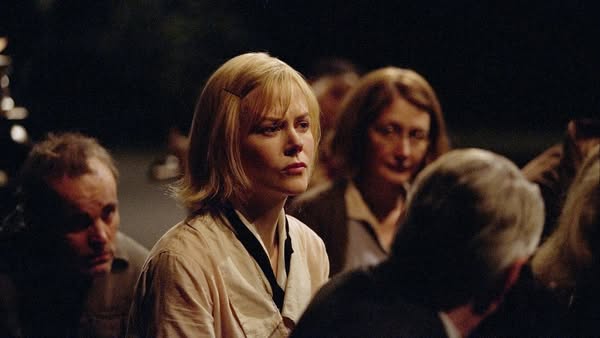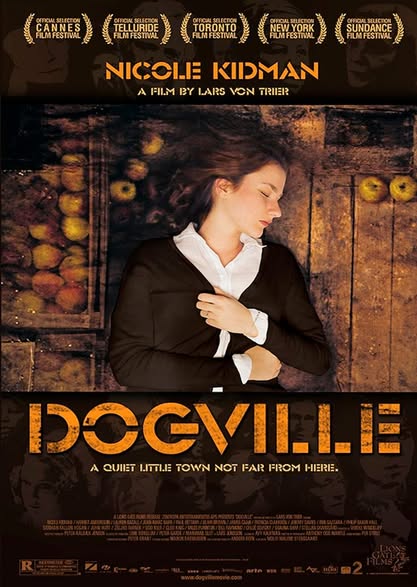Dogville (2003)

Dogville (2003) is a striking and provocative film written and directed by Lars von Trier. Known for its unconventional narrative and minimalist staging, the film is an ambitious exploration of human nature, morality, and the darker aspects of society. Set in the 1930s, it stars Nicole Kidman as Grace Margaret Mulligan, a woman who seeks refuge in the small, isolated town of Dogville after fleeing from gangsters.
The film is presented in a unique theatrical style, with a bare set that outlines the town’s buildings and streets, allowing the audience to focus on the characters and their interactions. This minimalist approach serves to heighten the emotional intensity of the narrative, as the story unfolds in a series of acts that resemble a stage play.

Grace arrives in Dogville seeking help, and the townspeople, led by Tom Edison (Paul Bettany), agree to hide her in exchange for her labor. Initially welcomed, Grace’s situation gradually shifts as the townspeople’s attitudes towards her change, revealing their hypocrisy and moral failings. The film delves into themes of compassion, betrayal, and the capacity for cruelty, ultimately questioning the nature of humanity itself.
Dogville is a powerful drama that combines elements of social critique and psychological exploration. Von Trier’s direction is bold and unflinching, compelling viewers to confront the uncomfortable truths about human behavior. The pacing allows for a gradual build-up of tension, with each act revealing more about the characters and their motivations.

Nicole Kidman delivers a remarkable performance as Grace, capturing the character’s vulnerability and strength as she endures increasing hardship. The ensemble cast, including Paul Bettany, Lauren Bacall, and Stellan Skarsgård, contributes to the film’s emotional depth, portraying the complexities of their roles with nuance.
The film’s stark visual style, combined with its haunting score, enhances the overall atmosphere, creating a sense of foreboding that permeates the narrative. The absence of conventional cinematic techniques, such as elaborate sets and special effects, forces the audience to engage more deeply with the story and its themes.

Dogville is ultimately a challenging film that invites viewers to reflect on moral dilemmas and the nature of societal constructs. Its exploration of power dynamics, vulnerability, and the consequences of human actions makes it a thought-provoking experience.
In summary, Dogville is a bold and ambitious cinematic work that pushes the boundaries of traditional filmmaking. With its unique presentation, powerful performances, and profound themes, it stands as a significant entry in Lars von Trier’s filmography and a compelling examination of human nature and morality. Its lasting impact lies in its ability to provoke discussion and reflection on the complexities of society and the human condition.











